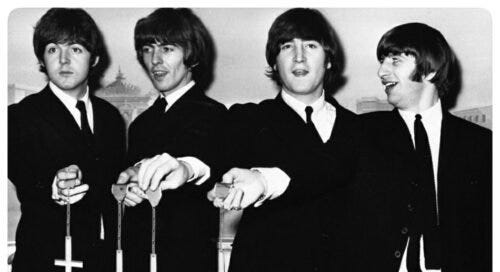A few months after the death of Marx, Engels said that 'it is a peculiar fact that with every great revolutionary movement the question of 'free love' comes to the foreground’.1 Why is this? What recent movements show it? And can we see it today?
French Ferment
In his 1791 novel Justine, the Marquis de Sade showed how sexual radicalism leads to political revolution. Justine suffers because she doesn’t recognise that God is evil and wickedness is the source of human activity; her sister, Juliette, thrives because she delights in evil. Four years afterwards, heads rolled in the French Revolution as de Sade watched and cheered.
But after Napoleon abdicated, the radicals went underground, where they continued to work on destabilising the family as the fundamental social unit. They had two aims: population control, and the destruction of Christianity. Both are connected because God told man to be fruitful and multiply. As Marx said, “the secret to the Holy Family is the earthly family. To make the former disappear, the latter must be destroyed, in theory and in practice.”2
In 1798, Thomas Robert Malthus claimed the birth rate had to be reduced. Population growth, he feared, would outstrip food production. The elites, naturally, believed they should decide who should live and die. Charles Trevelyan, the Assistant Secretary to the Treasury, called the Irish potato famine of the 1840s an “effective mechanism for reducing surplus population.”
In France in the 1830s and 1840s, Charles Fourier’s ideas were influencing the socialist movement. And his ideas on the family were made widely available with the publication of the first volume of the Oeuvres Completes in 1841. He believed monogamy was an institution contrary to human nature and hence an impediment to human happiness, so he wanted latitude for the sexual passions, including orgies. Children would be raised communally; society would be one big family.
‘Freed’ from Family
In Britain, the Utopian socialist Robert Owen, writing around the same time, believed communities of 500-2000 people would take the place of the family. This would bring about the socialist revolution. And Owen stressed the importance of education: children had to be removed from the dangerous influence of parents to shape them to fit the revolutionary agenda.
A few decades later, prominent socialist elites championed eugenics. George Bernard Shaw, for example, said that, ‘if we desire a certain type of civilisation and culture, we must exterminate the sort of people who do not fit into it’,3 and H. G. Wells advocated the extermination of the ‘vicious, helpless and pauper masses, the weak and silly and pointless’.4
During the Russian Revolution, Alexandra Kollontai - the first woman on the St. Petersburg Revolutionary Council and commissar for public welfare under Lenin - then attacked the family. She legalised divorce and abortion, established communal houses, and promoted free love: “[T]he home fire is going out in all classes and strata of the population, and of course no artificial measures will fan its fading flame.”5
Kollontai was implementing the ideas of August Bebel, who’d been heavily influenced by Fourier: 'It is a peculiar fact that with every great revolutionary movement the question of 'free love' comes to the foreground’. As E. Michael Jones put it, Sexual revolution is the political mobilization of sexual vice.'6
Meanwhile, in the US, in 1921, Margaret Sanger founded the American Birth Control League, which openly advocated eugenics for racist purposes; this would later be renamed Planned Parenthood. Marie Stopes also opened a birth-control clinic in London in 1921. And in the 1927 Supreme Court case Buck v. Bell, the justices legalised sterilisation of “undesirable” citizens.
Frankfurked
The Frankfurt School was founded in 1923. Originally conceived as the Institute for Marxism, it was renamed the Institute for Social Research to be more subtle. All three of Marx’s main predictions had not just failed but the opposite of them had occurred: the proletariat had shrunk and become richer; the middle class had grown and become richer; and so had the upper class. So the Frankfurt School aimed at translating Marxism from economic to cultural terms, seeing the family as the most important institution to infiltrate.
In 1923, Magnus Hirschfeld, who’d developed the theory that the binary gender system must be abolished, founded the ‘Institute for Nudism’. Understanding how media could change culture, he also produced and performed in the first homosexual film, ‘Different from the Others’. In 1928, he went on to found the World League for Sexual Reform.
And 1928 saw two other related events. First, John Watson published his book Psychological Care of Infant and Child, which sought to replace parental love and traditional standards of childrearing with “scientific” behavioural control. Each human being, he believed, was a malleable object that could be conditioned. Because people were less and less formed by and tied to religion, tradition, and morality, they could and needed to be reconditioned. The younger the person, the more this would succeed.
Second, Edward Bernays - a nephew of Sigmund Freud and the great uncle of the co-founder of Netflix, Marc Bernays Randolph - wrote his work Propaganda. He described manipulating mass opinion as ‘the engineering of consent’.“If we understand the mechanism and motives of the group mind,” he wrote, “is it not possible to control and regiment the masses according to our will without their knowing about it?” Its first chapter begins like this:
The conscious and intelligent manipulation of the organized habits and opinions of the masses is an important element in democratic society. Those who manipulate this unseen mechanism of society constitute an invisible government, which is the true ruling power of our country. We are governed, our minds molded, our tastes formed, our ideas suggested, largely by men we have never heard of. This is a logical result of the way in which our democratic society is organized. Vast numbers of human beings must cooperate in this manner if they are to live together as a smoothly functioning society. [. . .] in almost every act of our daily lives, whether in the sphere of politics or business, in our social conduct or our ethical thinking, we are dominated by the relatively small number of persons . . . who understand the mental processes and social patterns of the masses. It is they who pull the wires, which control the public mind.
Bernays knew that, without God, chaos would reign. Salvation depended on the elites. Accordingly, the behaviourist Bernard Berelson, funded by the Ford and Rockefeller foundations, developed the techniques of mass manipulation even further using radio and television.
West knows Best?
But Kollontai’s reforms had caused havoc in Russia. Starving women and children, no longer protected by alimony laws requiring men to support them, were supporting themselves with prostitution. The men who’d drafted Kollontai’s reforms were shot. Homosexuality restrictions were reinstated. Abortions were made more difficult. Asceticism returned to undermine attempts to sexually enlighten children. Divorce laws were reintroduced. The family was supported again. Communal childrearing stopped. Authoritative schooling returned.
The West didn’t heed the warning: in the 1930s, the Rockefellers funded Sanger’s birth control agenda to ‘solve’ mass poverty during the Great Depression, and Wilhelm Reich watched the backlash in the Soviet Union in frustration from Germany. He’d wanted Russia to be a model Utopia. He knew ‘the sexual process of society has always been the core of its cultural process,’7 and he believed three orgasms a week would build a classless society.
It didn’t matter at all how people produced them.
‘The patriarchal family,’ he wrote in The Sexual Revolution (1936), ‘is the structural and ideological breeding ground of all social orders based on the authoritarian principle.’ Linking this authoritarian principle to God, he said, “we do not discuss the existence or non-existence of God—we merely eliminate the sexual repressions and dissolve the infantile ties to the parents.”
He aimed at destroying the “sex-negating atmosphere and structure of the family” by harnessing the fact that “revolutionary youth is hostile and destructive to the family.” This was his development of Freud’s ideas that religion, morality and parental authority are repressive, especially sexually, and Freud’s ideas were themselves developments of Engels’s fantasy vision of the first civilisations prior to private property and patriarchy as promiscuous communes. (There is no evidence for this. Private property and the family have existed for as long as human beings have.)
Who’s Your Daddy?
After WW2, the German ‘authoritarian character’ was blamed for the Holocaust. Germany had to be reeducated. And the only way to do that was for the family to be destroyed. A “liberated sexuality” free of “compulsory marriage,” the incest taboo, and prohibition of pedophilia was openly practiced in Berlin at “Commune I” and “Commune II”. The media covered it extensively, and anti-authoritarian schooling and parenting were pursued.
Alfred Kinsey’s work also contributed to this sexual radicalism. A homosexual sadomasochist, he published Sexual Behavior in the Human Male in 1948. His main aim was to attack the father as the figurehead of the patriarchal family: “The whole of our laws and customs in sexual matters is based on the avowed desire to protect the family and at the base of the family is the father. His behavior is revealed by the Kinsey report to be quite different from anything the general public had supposed reasonable or possible.”8
Financed by the Rockefeller Foundation, he aimed at making deviant sexual behaviour appear normal. This included using data on orgasms in children and babies collected by a paedophile. In 1951, however, the American Statistical Society discredited Kinsey’s data, but his report was still distributed with the aid of the New York Times. Although the Rockefellers had withdrawn funding after the Report was subjected to a congressional investigation, Hayz Sulzberger, the publisher of the newspaper, was on the board of the Rockefeller Foundation.
In 1949, the year after Kinsey’s work on male sexuality, Simone de Beauvoir wrote The Second Sex. She described pregnancy as “mutilation,” calling the foetus a “parasite” and “nothing like flesh.” Proud of her two abortions, de Beauvoir set up an abortion station in her Paris salon despite it being prohibited. Like many other leading French intellectuals, she also signed a petition to legalise paedophilia, totally abolishing the age of consent.
Kinsey then wrote Sexual Behavior in the Human Female in 1953. In all its 842 pages, it didn’t contain a single reference to motherhood. Herbert Marcuse, funded by the Rockefellers, heightened Kinsey’s destabilising impact by developing Reich’s idea of sexual liberation: the utopian society would be organised around pleasure. His book Eros and Civilization (1955) saw the deepest cause of repressive power relationships as the suppression of eros, and this vision inspired the hippies of the 1960s.
Musical Mayhem
Playboy, rock music and porn promoted the pleasure principle further, aided by the Tavistock Institute. According to Dr John Coleman, former British secret service, when Michael Jackson bought The Beatles’ songs, outbidding Paul McCartney, he discovered Theodor Adorno owned almost all of their music and lyrics because he had written them.9
Who was Adorno? From 1949, Adorno had been a prominent teacher at the Frankfurt School - originally called, remember, the Institute for Marxism and focused on subverting culture. From 1958, he had been the Institute’s Director. Adorno died in 1969, shortly after the Abbey Road album, and the Beatles broke up in 1970.
Coleman’s claim might seem preposterous, but appealing to ridicule is a fallacy. And the Brazilian philosopher Ovalo de Carvalho agrees with Coleman; moreover, many singers have had all or most of their work written for them - Elvis, for example, and Elton John - and the Tavistock Institute helped develop the Grateful Dead.
Alan Trist, a social engineer for the Tavistock Institute and the son of Eric Trist, one of Tavistock’s founding members, was their shadow manager. The Grateful Dead were heavily involved in the promotion of LSD, encouraging the counter-culture, breaking free from society - what Marcuse called ‘the great refusal’.
And the style of the Beatles was also a refusal. By 1923, Schoenburg had evolved the ‘free atonality’ he had been experimenting with into twelve-tone composition, describing it as a way of ‘breaking free of what the ear had gradually become acquainted with’.10
Adorno called twelve-tone ‘the predominance of dissonance’. For him, it meant attacking order, and Womack and Cox note how ‘the aura of Schoenberg’s atonality colored a number of interludes and passages’ in the Beatles, ‘very much in keeping with the 12-tone pitch matrix system fostered by Schoenberg’.11
The only composer on the cover of Sgt. Pepper is Karlheinz Stockhausen, who’d worked at an electronic music studio in Cologne focused on developing Schoenberg’s serialism through new degrees of control made possible by electronic instruments and the tape recorder. His goal was to ‘invest electronic music with a religious spirituality.’
Aleister Crowley, regarded as a Satanist during his lifetime and fond of eating his own excrement, is on the album cover of Sgt. Pepper in the group of people the Beatles called ‘people we like’. Charles Manson claimed he got his inspiration from the Beatles and wrote their lyrics in blood on the walls of his victim Sharon Tate’s house.
As Plato’s Socrates says, ‘rhythm and harmony find their way into the inward places of the soul, on which they mightily fasten.’ Even if we assume for the sake of argument that Coleman and de Carvalho are wrong about Adorno and the Beatles, the point still stands that the music advanced the Frankfurt School agenda of free love.
The Gender Agenda
While the Beatles broke free from all accepted rules of music, the hippies made free love. And John Money opened the first clinic for sex change operations in the early 1960s, the Gender Identity Clinic. Like Kinsey, Money promoted sexual deviance. For him, even sex murder was just a different ‘preference’. He advocated sex games for children.
Money based his Clinic on an experiment with a pair of twin brothers. After a botched circumcision, one of the twins, Bruce Reimer, had sex reassignment surgery and became Brenda. With Money’s guidance, his parents raised him as a girl for 10 years. But he was always troubled and decided to live as a boy after discovering what had happened to him. At age 38, he shot himself with a shotgun - two years after his twin brother, Brian, had overdosed.
Remember that promoting sexual deviance and population reduction go together. President Johnson, in his January 4, 1965, State of the Union address, said, “I will seek new ways to use our knowledge to help deal with the explosion in world population and the growing scarcity in world resources.”
In the same year, Sanger achieved her life’s goal: the US Supreme Court declared laws against birth control unconstitutional. And in the same year, too, the Eli Landau holocaust porn film The Pawnbroker broke Section Seven subsection two of the Motion Picture Production code, which was one of Hollywood's last remaining taboos. Deep Throat and The Devil in Miss Jones followed in 1973.
Writing in 1974, Andrea Dworkin believed ‘children are fully capable of participating in community, and have every right to live out their own erotic impulses’, so she hoped that ‘the distinctions between “children” and “adults”, and the social institutions which enforce those distinctions, would disappear as androgynous community develops’.12
Marcuse, funded by the Rockefellers, had also envisioned such a society of ‘polymorphous perversity’. David Thorstad, the former president of the Gay Activists Alliance, which opposed age of consent laws from its inception in 1969, wrote that ‘boy-lovers were involved in the gay movement from the beginning, and their presence was tolerated.’13
In 1975, a gay rights conference in Sheffield backed a motion in favour of paedophilia. The Guardian covered it, writing, "Child-lovers win fight for role in Gay Lib”. In 1979, the inaugural issue of the Gay Community News published a “Statement to the Gay Liberation Movement on the Issue of Man/Boy Love” that argued for the sexual free expression of children.
Labour deputy leader Harriet Harman - who introduced the Equality Act 2010 - worked at the National Council for Civil Liberties in the 1970s, and the Paedophile Information Exchange was affiliated to it. PIE’s aim was normalising sex with children as the sexual liberation of children. It campaigned for "children's sexuality" and received invitations from student unions, won sympathetic media coverage and found academics willing to push its message.
On at least two occasions, the Campaign for Homosexual Equality conference passed motions in PIE's favour. PIE argued there should be no age of consent. 'Love is love', paedophiles argue, leads logically to the protection of all sexual orientations, and no queer theorist has ever argued against them. Perhaps the most famous, Michel Foucault, raped little boys in Tunisia.
In Germany, the Green Party was still attempting to legalise paedophilia in the 1980s and 1990s. In 1985, the North American Man Boy Love Association (NAMBLA) - whose journal counter-cultural poet Alan Ginsberg wrote for - became a member of New York’s council of Lesbian and Gay Organizations as well as the International Gay Association – now the International Lesbian and Gay Association (ILGA). This lost ILGA its NGO status in the UN.
ILGA tried to regain it in April 2002 but was refused because it didn’t prove it had purged paedophile groups. The Washington Times reported that the Pakistani delegate to the UN Economic and Social Council expressed concern: “For more than a year, the ILGA has refused to provide documentation or allow review of its membership list to demonstrate that pedophilia groups have been expelled.”14
In 2014, the German Ethics Council called for incest between siblings to be decriminalised, and tolerance for Minor Attracted Persons is being called for today.
The Road to Rome
The promotion of the LGBTQ movement contributes to population reduction: only heterosexuals can reproduce. This is a symptom of falling civilisations. As the Roman Empire fell, for example, its cities abounded with male prostitutes, so common had homosexuality and bisexuality become. And sodomy was also a popular method of birth control.
But abortion, justified by Plato and Aristotle, was common. The excavation of a villa at Ashkelon found the remains of 100 new-born babies thrown into a sewer. Today, promoting abortion is the ‘solution’ to heterosexual reproduction. Britain, for example, would meet the replacement fertility rate if it weren’t for the 200,000 yearly abortions. The UN expects the fertility rate to fall below replacement level in three out of four developing countries by 2050, and the goal of zero carbon ultimately means zero people.
In 2010, the Rockefeller Foundation - so active throughout all the events outlined so far, intently focused on population reduction, birth control, behaviourism and sexual radicalism, funding Sanger, Berelson, Kinsey and Marcuse - published 'Scenario For The Future of Technology & International Development’. An article called ‘Lock Step’ outlined how a pandemic in the future ‘overwhelmed’ the world and led to ‘tighter top-down government control and more authoritarian leadership’ that gave ‘national leaders…more latitude to impose order in ways they saw fit’.15
This is the revolutionary dream and delusion: from chaos, order. ‘It is a peculiar fact that with every great revolutionary movement the question of 'free love' comes to the foreground’. Why? Sex, probably the most powerful human motivator, is weaponised to uproot people from religion and family.
With their moral and social bonds thus dissolved, people become atomised. And atomised people, led by their passions, are easier to manipulate in accordance with an agenda epitomised by Marx’s favourite line from Mephistopheles in Goethe’s Faust: ‘Everything that exists deserves to perish’.
Please share this article. People cannot fight this unless they know and understand how they have been attacked.
I will be following it up with an article on Unwin’s Sex and Culture (1934): he surveyed over 800 societies and found that collapse generally follows 100 years after sexual liberation. Starting from the 1960s, that gives us until around 2060.
The uneasiness in the air today is because we’re over halfway there.
'Das Buch der Offenbarung', in Marx-Engels Werke (Berlin, 1959), XXI, p.10.
https://www.marxists.org/archive/marx/works/1845/theses/theses.htm
https://gutenberg.net.au/ebooks03/0300561h.html#a01
https://www.gutenberg.org/files/19229/19229-h/19229-h.htm
E Michael Jones, Libido Dominandi, p.159
Ibid., p.32
Reich, The Sexual Revolution (Farrar, Straus and Girox, 1974), p.159
Quoted by Dr E. Michael Jones in Libido Dominandi, p.341
Dr John Coleman, The Conspirators’ Hierarchy (Bridger House Publications, 2016), p.89, 97
Kenneth Womack and Kathryn B. Cox, The Beatles, Sgt. Pepper, and the Summer of Love (Lexington Books, 2017), p.24
Ibid, p.24
Andrea Dworkin, Woman Hating (Dutton, 1974), pp.190-192
Thorstad, ‘Man/boy love and the American gay movement.’ J Homosex. 1990;20(1-2):251-74. doi: 10.1300/J082v20n01_15. PMID: 2086634.
George Archibald, “U.N. Group Keeps Ban on Gay Lobby,” Washington Times (May 1, 2002).
https://archive.org/details/scenarios-for-the-future-of-technology-and-international-development-rockefeller-foundation/page/18/mode/2up


















Share this post